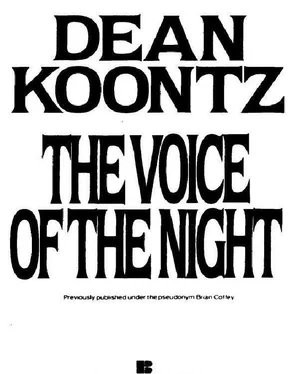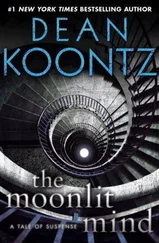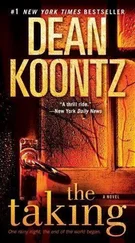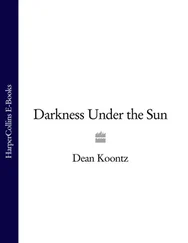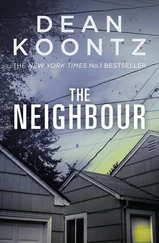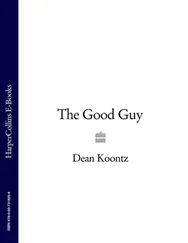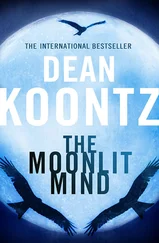Colin was painfully aware that his planning was guided by one overriding consideration: cowardice. Hide. Run. Hide. Run. He seemed incapable of entertaining any alternative to those weak courses of action, and he felt miserably inadequate.
— So stay here. Turn the tables on Roy.
Fat chance.
— Don’t run. Attack.
That’s a pleasant fantasy, but it’s impossible.
— It isn’t. Become the aggressor. Surprise him. He’s faster and stronger than me.
— Then be devious. Set a trap.
He’s too clever to fall for any trap I could set.
— How can you know if you don’t try?
I know.
— How?
Because I’m me. And he’s Roy.
Colin put a quick end to the interior dialogue because it was a waste of time. He understood himself all too well. He simply did not have within him the power or the will to transform himself. Before he tried to become the cat, he would have to be convinced that there was absolutely no percentage whatsoever in continuing to be the mouse.
This was one of those bleak and too-frequent moments in which he despised himself.
Pausing every few yards to reconnoiter the way ahead before pressing on, Colin crept from one car to another. He moved steadily toward the hill where Roy had attempted to push the Ford pickup into the train, for it was there that he most easily could get down to the railroad tracks. The night was much too still. Every rustle of his shoes in the brittle grass sounded like thunder and seemed certain to bring Roy down on him. Eventually, however, he came undiscovered to the far end of the junkyard.
In front of him, the open space between the last of the cars and the brow of the hill was approximately forty feet wide. At the moment it looked like a mile. The moon was shining unhindered, and that stretch of grass was bathed in far too much milky light to make a crossing feasible. If this area were being watched, he would be spotted before he had covered a quarter of the distance. Fortunately, scattered but solid masses of clouds had rolled in from the ocean during the past hour. Each time that a cluster of them shrouded the moon, the resultant darkness offered excellent cover. He waited for one of these brief eclipses. When the broad belt of grass fell under a shadow, he ran as silently as he could manage, up on his toes, holding his breath, to the brink, and then over.
The hillside was steep, but not so precipitous as to be unnegotiable. He went down fast because there was no other way to go; the pull of gravity was irresistible. He bounded wildly from one foot to the other, out of control, taking big, ungainly steps, and halfway to the bottom he found that he suddenly was dancing on a landslide. The dry, sandy soil collapsed under him. For an instant he rode it as if he were a surfer on a wave, but then he lost his footing, fell, and rolled the last twenty feet. He came to a stop in a cloud of dust, flat on his back, on the railroad right-of-way, one arm across the tracks.
Stupid. Stupid and clumsy. Stupid, clumsy idiot.
jeez.
He lay still for several seconds, a bit winded, but surprised that nothing hurt. His pride was injured, of course, but not anything else.
The dust began to settle.
As he started to sit up, Roy called to him: “Blood brother?”
Colin shook his head in disbelief and looked left, right, then up.
“Blood brother, is that you?”
The moon sailed out from behind the clouds.
In the wash of pale light, Colin saw Roy standing at the top of the eighty-foot slope, silhouetted against the sky, staring down.
He can’t see me, Colin told himself. At least he can’t see me as clearly as I see him. He’s there with the sky behind him; I’m here in the shadows.
“It is you,” Roy said.
He charged down the hillside.
Colin got up, stumbled over the railroad tracks, and hurried into the wasteland beyond.
Colin felt terribly vulnerable as he raced across the field. As far as the moonlight revealed, there was no cover, no place for him to hide. He had the crazy thought that a giant shoe was going to come down on him at any second, squashing him as if he were a bug scurrying across a vast kitchen floor.
In the stormy season, rain saturated the hillsides, then gushed off the slopes into natural drainage channels that cut through the flat land west of the railroad tracks. At least once every winter, the gullies overflowed, and the plain became a lake, part of the water-retention system created by the county flood-control project. Because the earth was underwater an average of two months every winter, it boasted very little vegetation even in the summer. There were patches of grass that had a tenuous hold on the silt, beds of the wildflowers that thrived nearly everywhere in California, and prickly tumbleweed; but there were no trees, no dense undergrowth, and no bushes in which Colin could conceal himself.
He got off the bare land as quickly as he could by jumping down into a small arroyo. The gulch was fifteen to twenty feet in width and more than seven feet deep, with almost vertical walls. During a winter storm, it was a surging river, wild and muddy and dangerous, but now it held not one drop of water. He sprinted along a straightaway, pain stabbing through his calves and side, lungs burning. As he came to a broad curve in the arroyo, he glanced back for the first time since he’d crossed the railroad tracks. So far as he could see, Roy had not yet come down into the big ditch in pursuit of him. He was surprised that he had such an encouraging lead, and he wondered if it were possible that Roy had not seen where he’d gone.
Beyond the bend, seeking shelter, he turned into a secondary watercourse that branched off the main channel. This was about ten feet wide at its mouth, but the walls rapidly drew nearer to each other as he progressed to the source. The floor rose steadily until the depth of the gully decreased from seven to five feet. When he had gone no more than a hundred yards, the passageway had narrowed to six feet. If he stood erect, his head would be above ground level. At that point the channel split into a pair of short, dead-end corridors that cut no more than four feet below the surface of the field. He moved into one of these cul-de-sacs, wedged himself into it, each shoulder pressed firmly against a sandy embankment. He sat down, drew his knees up to his chin, clamped his arms around his legs, and tried to be invisible.
— Rattlesnakes.
Oh, jeez.
— Better think about it.
No.
— This is rattlesnake country.
just shut up.
— Well, it is.
They don’t come out at night.
— The worst things always come out at night.
Not rattlesnakes.
— How do you know?
I read it in a book.
— What book?
Can’t remember the title.
— There wasn’t any book.
/tMt shut up.
— Rattlesnakes all over the place.
jeez!
He hunched down in the dirt, listening for rattlesnakes, waiting for Roy; and a long time passed during which he was not bothered by either nemesis. Every few minutes he checked his digital watch, and when he had been in the ditch for half an hour, he decided it was time to leave. If Roy had been searching the network of drainage canals all this time, he would have come close enough for Colin to be aware of him, or at least he would have made a noise in the distance; but he had not. Evidently he had abandoned the pursuit, perhaps because he’d lost track of Colin in the dark, hadn’t seen in which direction he had gone, and had no clear idea where to look for him. If true, it was a tremendous piece of luck. But Colin felt that he would be pushing Fate too hard if he stayed where he was, in this den of vipers, expecting to be safe forever from rattlesnakes.
Читать дальше
